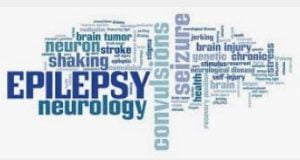
Tuesday 26th March is Epilepsy Awareness Day, also known as is wear Purple Day for Epilepsy, a special event which promotes awareness of epilepsy.
The condition affects around 600,000 people in the UK, is the 4th most common neurological disorder and affects all types of people. It is one of the most common serious neurological (brain) conditions in the world and almost 1 in 100 people in the UK have epilepsy and around 87 people are diagnosed with epilepsy in the UK every single day.
It is characterized by unpredictable seizures which can start at any age and there are many different types. A seizure happens when there is a sudden burst of intense electrical activity in the brain. This causes a temporary disruption to the way the brain normally works. The result is an epileptic seizure. There are around 60 different types of seizure and a person may have more than one type. For some, seizures are life-threatening: 1,000 people die in the UK every year because of their epilepsy. As many as 400 of these deaths could be prevented.
Seizures are generally described in two major groups: generalized and focal. The difference between types of seizures is in how and where they begin in the brain. and may have other symptoms of neurological problems. The seizures can be related to a brain injury, can be hereditary or for some sufferers, the reason is completely unknown.
Public misunderstandings of epilepsy cause challenges that can often be worse than the seizures themselves. A lack of awareness about epilepsy can contribute to stigma and discrimination. It can also make some people uncomfortable to talk about their epilepsy, even when they want or need to. Sometimes epilepsy and seizures can be mistaken for mental illness. For example, a person may make unusual noises, use strange words and/or behave oddly when having a seizure. However, like anyone else, some people with epilepsy can develop mental health conditions, such as depression and/or anxiety. Not all seizures require hospitalisation. Most often, the person will just need time to rest and recover after a seizure, which they might be able to do at work, school or home. If you don’t know the person and witness them having a seizure, it is best to call for an ambulance.
Restraining someone during a seizure is more likely to agitate or harm that person (or you). A seizure will run its course and restraining someone will not stop or slow it down. Seizure first aid depends on the type of seizure.
The main treatment for epilepsy is epilepsy medicines. These are sometimes called anti-epileptic drugs or AEDs. The medicine doesn’t cure epilepsy, but helps to stop or reduce the number of seizures.
Our Epilepsy Awareness and buccal midazolam course is aimed at staff working with and supporting people with epilepsy, who wish to gain a greater knowledge of the condition including administration of buccal midazolam and if required rectal diazepam. Midazolam belongs to a group of medicines called benzodiazepines, which are used to treat a number of different conditions, including seizures. If a seizure lasts for more than five minutes, it may be difficult to stop unless treatment is given. This course includes practical skills including simulating the administration oral buccal midazolam and rectal diazepam using a manikin.
We offer this as both an open course (at our Warmley training centre) and in house course at a venue of your choice. The course is delivered by knowledgeable and enthusiastic Registered Nurses all of whom hold adult teaching qualifications supported by a professional qualification and considerable, hands on practical experience which is reflected in our grounded, pragmatic approach.
The course is half day (3 hours) and employs a variety of teaching techniques to meet the needs of individual delegates and includes the following:
• Understanding of epilepsy
• Types of seizure
• Triggers
• Emergency management
• Buccal midazolam administration
• Rectal diazepam administration (when requested)
You can view a host of testimonials on this course, and all of our other courses for that matter, on our testimonials page. Whatever your training needs, give us a call today 0117 453 9278 or e-mail us
If you are keen on getting involved with Epilepsy Action, they host various fundraising challenges and events throughout the year that you can get involved in.
